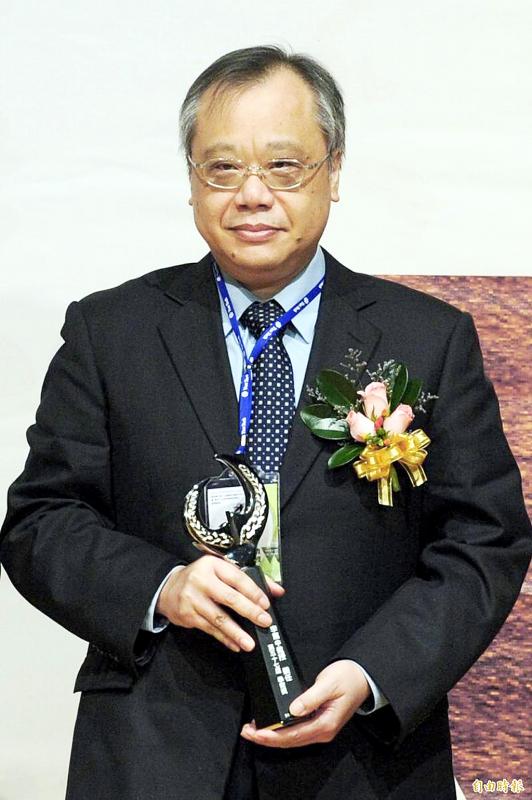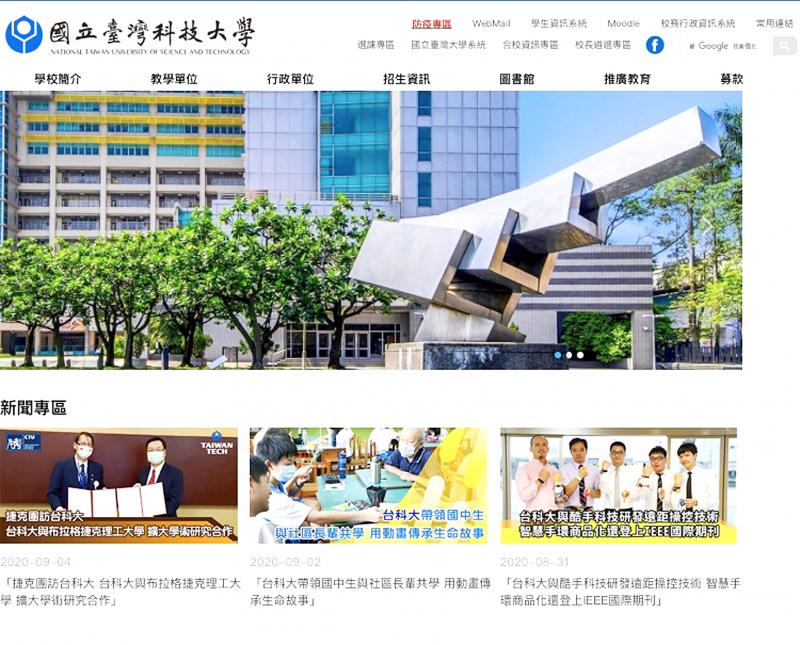A candidate for the post of National Taiwan University of Science and Technology (NTUST) president yesterday dropped out of the race following a report questioning his links to Chinese academia and government programs.
Lee Duu-jong (李篤中), a professor at National Taiwan University’s (NTU) chemical engineering department, was a member of China’s Changjiang Scholars’ Program in 2006 and was on the list of its Thousand Talents Program in 2017, a report by Chinese-language Mirror Media magazine said yesterday.
The article said that Lee is suspected of having held a part-time job at the Harbin Institute of Technology in China and was the recipient of as much as 6.5 million yuan (US$958,000) in Chinese research grants.

Photo: Taipei Times file photo
Lee, who had previously served as NTUST vice president, issued a statement denying that he had held a part-time position in China.
The NTUST had looked into the matter and confirmed that he was not listed under the Thousand Talents’ Program, he said, adding that all his research collaborations in China and across the world were in full compliance with Ministry of Education regulations.
NTUST professors urged the ministry to clarify regulations to prevent a repeat of the NTU debacle.

Photo: Rachel Lin, Taipei Times
From 2018 to January last year, the NTU’s presidential seat was left vacant as the ministry refused to recognize the validity of the election of Kuan Chung-ming (管中閔), citing a conflict of interest and allegations that he had held positions at Chinese universities.
Despite the controversy, Kuan took office as NTU president in January last year.
The ministry yesterday reiterated an Executive Yuan statement in 2018 that employees at universities, as well as public and private research facilities, cannot take part in projects funded by the Chinese government, including the Thousand Talents Program and its subsequent Ten Thousand Talents Program.
This is a standing policy that has been communicated to universities nationwide multiple times, the ministry said in a statement.
It urged the NTUST presidential review committee to ask Lee to provide details to address these issues.
It also asked NTU, Lee’s current employer, to convene a committee to determine whether he had contravened regulations on taking a post at a Chinese university.
The ministry’s statement said that academics who have not obtained approval before taking a position at a Chinese university would be in contravention of the Act Governing Relations Between the People of the Taiwan Area and the Mainland Area (台灣地區與大陸地區人民關係條例), or Article 34 of the Act Governing the Appointment of Educators (教育人員任用條例).
A Central News Agency report said that the ministry declined to respond to its questions on whether it has a list of Taiwanese academics on the Changjiang Scholars’ Program or the Thousand Talents Program.
The ministry also remained silent on whether there was precedent to college presidents retaining a part-time job in China and what ministry processes were involved in making such identification.
China’s Taiwan Affairs Office spokesperson Zhu Fonglian (朱鳳蓮) said that as of November last year, there were 72 academics listed on the Thousand Talents Program, and there were 1,600 Taiwanese teachers employed in Chinese schools.
The Thousand Talents Program was an initiative launched by Beijing in 2008 to attract top academics and scientists from abroad. It has recently attracted controversy amid reports that it encourages intellectual property theft by program participants to boost development of emerging technologies and industries in China.
Additional reporting by CNA

CHAOS: Iranians took to the streets playing celebratory music after reports of Khamenei’s death on Saturday, while mourners also gathered in Tehran yesterday Iranian Supreme Leader Ayatollah Ali Khamenei was killed in a major attack on Iran launched by Israel and the US, throwing the future of the Islamic republic into doubt and raising the risk of regional instability. Iranian state television and the state-run IRNA news agency announced the 86-year-old’s death early yesterday. US President Donald Trump said it gave Iranians their “greatest chance” to “take back” their country. The announcements came after a joint US and Israeli aerial bombardment that targeted Iranian military and governmental sites. Trump said the “heavy and pinpoint bombing” would continue through the week or as long

TRUST: The KMT said it respected the US’ timing and considerations, and hoped it would continue to honor its commitments to helping Taiwan bolster its defenses and deterrence US President Donald Trump is delaying a multibillion-dollar arms sale to Taiwan to ensure his visit to Beijing is successful, a New York Times report said. The weapons sales package has stalled in the US Department of State, the report said, citing US officials it did not identify. The White House has told agencies not to push forward ahead of Trump’s meeting with Chinese President Xi Jinping (習近平), it said. The two last month held a phone call to discuss trade and geopolitical flashpoints ahead of the summit. Xi raised the Taiwan issue and urged the US to handle arms sales to

BIG SPENDERS: Foreign investors bought the most Taiwan equities since 2005, signaling confidence that an AI boom would continue to benefit chipmakers Taiwan Semiconductor Manufacturing Co’s (TSMC, 台積電) market capitalization swelled to US$2 trillion for the first time following a 4.25 percent rally in its American depositary receipts (ADR) overnight, putting the world’s biggest contract chipmaker sixth on the list of the world’s biggest companies by market capitalization, just behind Amazon.com Inc. The site CompaniesMarketcap.com ranked TSMC ahead of Saudi Aramco and Meta Platforms Inc. The Taiwanese company’s ADRs on Tuesday surged to US$385.75 on the New York Stock Exchange, as strong demand for artificial intelligence (AI) applications led to chip supply constraints and boost revenue growth to record-breaking levels. Each TSMC ADR represents

State-run CPC Corp, Taiwan (CPC, 台灣中油) yesterday said that it had confirmed on Saturday night with its liquefied natural gas (LNG) and crude oil suppliers that shipments are proceeding as scheduled and that domestic supplies remain unaffected. The CPC yesterday announced the gasoline and diesel prices will rise by NT$0.2 and NT$0.4 per liter, respectively, starting Monday, citing Middle East tensions and blizzards in the eastern United States. CPC also iterated it has been reducing the proportion of crude oil imports from the Middle East and diversifying its supply sources in the past few years in response to geopolitical risks, expanding